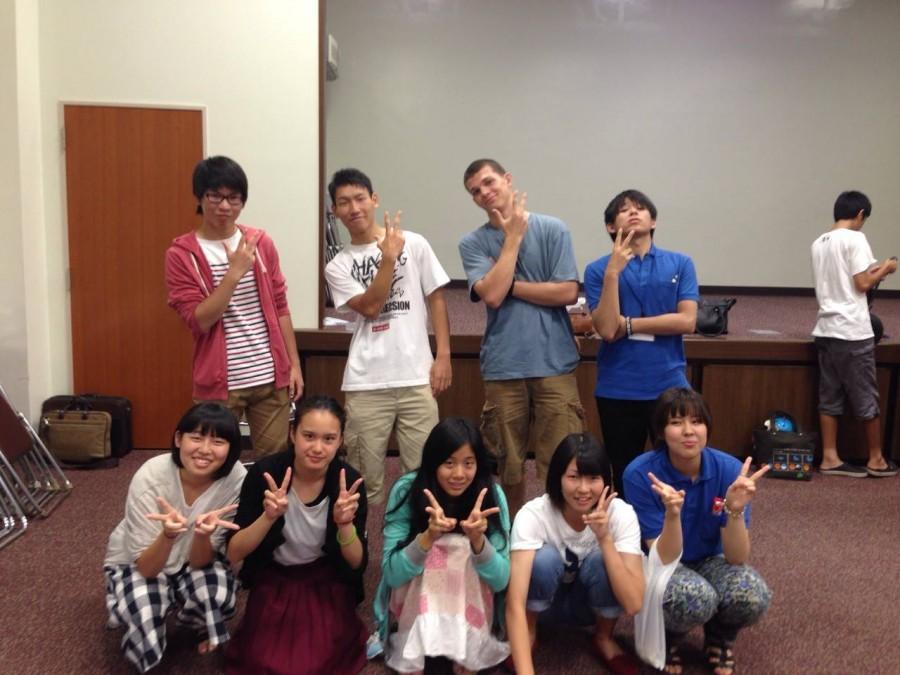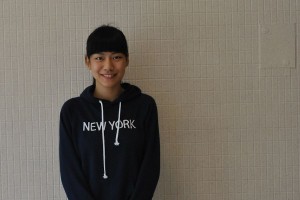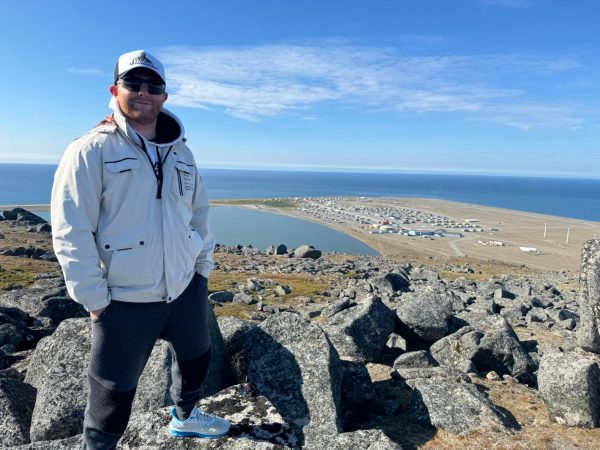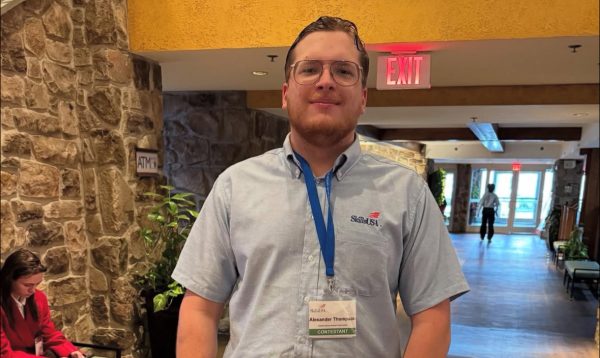TAHS student Jacob Damon living in Japan through Rotary Exchange
Rotary District 7360 sends approximately twenty students to study abroad each year. Among those twenty, Jacob Damon from Tyrone High School was selected to live and study in Fukui, Japan. Damon has been in Japan since August and will not return to the United States until July 2015.
“I wanted to study abroad because I want to travel the world,” said Damon, “So instead of waiting until I got a career, I thought why not start now.”
As for Damon’s choice of countries, Japan stood out for him because of its radically different culture.
“I chose Japan because I wanted to challenge myself to the most diverse country from the U.S. I also found the Japanese culture very unique and inspiring from what I found online,” said Damon.
Damon is living in the city of Fukui, which about a four hour drive west of Tokyo. He will be in Japan for about 10-11 months participating in community service and events through Rotary and also activities through his school.
“Japan is absolutely fantastic, it’s so great being here, I wish everyone could experience this,” said Damon in a recent Eagle Eye interview.
Damon lives with the Ito family in Fukui. They have three other children, Yoshito, an 18 year old boy, Ayano a 16 year old girl and Akaki, a 13 year old boy. Damon and his “siblings” all go to different schools.
Damon normally wakes up at 6 am for school and does his morning ritual, which is online seminary, reading scriptures and putting on his school uniform. After breakfast his host mother packs him a “bento” for lunch (Japanese lunch box, usually two small boxes stack on top of one another, the bottom: generally plain rice, the top: a variety of foods packed together).
Keeping up with his spiritual life has been one challenge for Damon.
“Japan is the 2nd least religious country in the world. Even though they practice some religious rituals, but often only because it’s a tradition,” said Damon. “Shinto and Buddhism are the two main religions in Japan.”
“Luckily for me, I can still attend to my own church here in my city, I go on every Sunday possible. They also have some Catholic churches that I’ve seen while roaming around the city,” said Damon.
Like many Japanese students, Damon travels to school on a bike. However, there is a lot more traffic on the roads in Japan than in Tyrone.
“We don’t have that kind of traffic in Tyrone,” Damon said, “I myself tend not to follow my own wisdom simply because I can’t handle going slow therefore I go too fast, so it makes checking the road meaningless.”
When students arrive at school they first must take off their shoes and exchange them for school slippers.
Damon stays in one classroom for the entire day except for P.E. Students get ten minutes of free time between each class. The school day begins at 8:30am and ends around 3:30 or 4:20pm.
“During school, I self-study Japanese using books I brought from America and help students learn English during English class,” said Damon, “we never leave our classroom for another class or even lunch, except for P.E. During P.E, which we have every other day all yea. We run, A LOT, usually the entire period of running around the school neighborhood, which is bigger than it sounds. Mainly to train for the eight kilometer school race that most of the 900 students participate in.”
At school, students can also leave their belongings in the classroom and it’s safe. There are no lockers or locked doors in the school he attends.
“Here, every time we go somewhere, my friends would always say, ‘just leave your stuff here, you won’t need it.’ The bag with my wallet, and sometimes my PC in it. I’ve always know Japan is safer and hardly anyone steals, but I had to get used to it myself,” said Damon. In between each class there’s a 10-15 minute break. The teachers leave the students alone during lunch and between classes.
Another Japanese school tradition is that all students must stand, bow and greet one another simultaneously at the beginning and end of each class.
“Japanese students definitely do work harder in school,” said Damon. “They are always busy studying for tests. A student having free time is almost unheard of. That’s why it’s difficult for me to spend time with them. It’s also difficult before about 95% of my school are girls. There are only two other guys in my class.”
At the end of the school day, the students are required to clean the entire school, sweeping all the floors.
Right after school Damon works out with the track and field team. Damon also started karate on Wednesdays and Fridays in October.
“On Thursdays, I have a private tutor for an hour and a Japanese language class for two hours right after the tutor, right after school,” said Damon.
Although he knew that the two cultures would be very different, some of the differences between Japanese and American culture were surprising to Damon.
For example, according to Damon, the Japanese don’t really wear sunglasses.
“It’s rare to see people wearing sunglasses, unless they’re driving,” said Damon, “I see more drivers using sunglasses, but even then, hardly used. I asked about it and they said it’s not because they think it’s healthier without them, they just simply don’t wear them as a society” said Damon.
As for the food, its very different than American food, but in a good way.
“It is WAY different then what we eat. [But] in my opinion, it tastes better, it’s healthier, and it always has rice with it, except for breakfast,” said Damon.
“My favorites are, udon, curry rice, and ramen. Not Maruchan Ramen, that’s disgusting compared to this. It’s much healthier, served in a big portion, and absolutely delicious. And you’re supposed to slurp while eating your soup,” said Damon.
Another strange food difference that Damon has noticed is that the Japanese hardly ever use peanut butter.
“I love peanut butter, but here it’s not as common and they come in very small quantity. I still bought some to quench my appetite for peanut butter, they don’t eat just plain peanut butter, so they were quite shocked that I eat it with a spoon during lunch, it was quite amusing to them,” said Damon.
Of course, the language is quite different from English and has presented quite a challenge for Damon. The Japanese do not use the same alphabet as English speakers, their system of characters and symbols is called Kanji or Kana.
Damon shared a few examples of Japanese language with us:
よろしくおねがいします – “yoroshiku onegai shimasu” which means “Please take care of me.” This is the common introduction for meeting someone or even needing help.
Another is かわいい – kawaii – which means “cute.” Many Americans may have heard of this, but Damon hears it multiple times everyday.
“Right before I leave the house I always say “ittekimasu”, which means “I’m leaving” and the other person would say “itterasshai” means “be safe.”
Coming home I would say “tadaima” – I’m home and the other person would say “okaeri,” meaning welcome home.
As for being homesick, Damon says he’s doing just fine.
“I definitely miss my family, but I’m not homesick at all,” said Damon, “Maybe it’s because I’m used to traveling and I love being here. They don’t visit and won’t because it’s very expensive and also most of my siblings have babies and toddlers which makes it impossible for most of my family to visit.”

My name's Carly Crofcheck. I've been in the Tyrone Eagle Eye for four years and I'm a Senior at TAHS. Last year I was the Editor in Chief, this year...

















Coach Everhart • Jun 11, 2015 at 9:22 am
Key Quotes:
1. “About 95% of my school are girls. There are only two other guys in my class.”
2. “Kawaii means “cute.” …Damon hears it multiple times everyday.”
3. I’m not homesick at all,” said Damon.
Looks like you did your research well, Jake.
Jake • Jun 15, 2015 at 12:56 am
Thanks Coach everhart. However, Carly did the `research` on me. 😉 And the percentage of girls are little off since that and other infomation was given early in my exchange here. Although, overall a great report. Thanks Carly =D
Giulia • Jun 21, 2022 at 6:50 pm
You were lucky in this sense because in Asia they’re more boys than girls, studying and watching natality 🙂